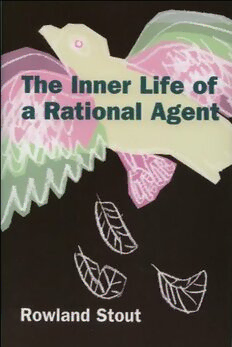Download The Inner Life of a Rational Agent: In Defence of Philosophical Behaviourism PDF Free - Full Version
Download The Inner Life of a Rational Agent: In Defence of Philosophical Behaviourism by Rowland Stout in PDF format completely FREE. No registration required, no payment needed. Get instant access to this valuable resource on PDFdrive.to!
About The Inner Life of a Rational Agent: In Defence of Philosophical Behaviourism
A radical approach to the philosophy of mind, in which states of mind are identified with dispositions to behave in certain ways.The approach taken by Rowland Stout is a thoroughly up-to-date version of behaviourism, although not a form of behaviourism that denies the existence of consciousness, free will, rationality, etc., nor aims to reduce these to other sorts of things. Properly understood, the idea of being disposed to behave in a certain way is seen to be exactly as rich and interesting as the idea of being in a certain state of mind. The fact that our ways of behaving are sensitive to practical rationality is taken to be an essential aspect of our nature as conscious agents. And in describing such a version of practical rationality Stout claims we are describing the mental state of someone whose behaviour is sensitive to it.His account of behaviourism rests on two central notions - that of a causal disposition to behave and that of sensitivity to practical rationality. He explains and develops these notions in some detail, and then uses them to construct powerful and original accounts of belief, intention, knowledge, perception and consciousness.Key Features* A systematic and completely original theoretical approach to the philosophy of mind.* A re-evaluation of the history of the philosophy of mind based on a rejection of the generally accepted arguments in the 1960s and 1970s used by functionalists against behaviourists.* A serious engagement with the intuitively compelling issues concerning behaviourism.
Detailed Information
| Author: | Rowland Stout |
|---|---|
| Publication Year: | 2006 |
| ISBN: | 9780748626731 |
| Pages: | 233 |
| Language: | English |
| File Size: | 0.71 |
| Format: | |
| Price: | FREE |
Safe & Secure Download - No registration required
Why Choose PDFdrive for Your Free The Inner Life of a Rational Agent: In Defence of Philosophical Behaviourism Download?
- 100% Free: No hidden fees or subscriptions required for one book every day.
- No Registration: Immediate access is available without creating accounts for one book every day.
- Safe and Secure: Clean downloads without malware or viruses
- Multiple Formats: PDF, MOBI, Mpub,... optimized for all devices
- Educational Resource: Supporting knowledge sharing and learning
Frequently Asked Questions
Is it really free to download The Inner Life of a Rational Agent: In Defence of Philosophical Behaviourism PDF?
Yes, on https://PDFdrive.to you can download The Inner Life of a Rational Agent: In Defence of Philosophical Behaviourism by Rowland Stout completely free. We don't require any payment, subscription, or registration to access this PDF file. For 3 books every day.
How can I read The Inner Life of a Rational Agent: In Defence of Philosophical Behaviourism on my mobile device?
After downloading The Inner Life of a Rational Agent: In Defence of Philosophical Behaviourism PDF, you can open it with any PDF reader app on your phone or tablet. We recommend using Adobe Acrobat Reader, Apple Books, or Google Play Books for the best reading experience.
Is this the full version of The Inner Life of a Rational Agent: In Defence of Philosophical Behaviourism?
Yes, this is the complete PDF version of The Inner Life of a Rational Agent: In Defence of Philosophical Behaviourism by Rowland Stout. You will be able to read the entire content as in the printed version without missing any pages.
Is it legal to download The Inner Life of a Rational Agent: In Defence of Philosophical Behaviourism PDF for free?
https://PDFdrive.to provides links to free educational resources available online. We do not store any files on our servers. Please be aware of copyright laws in your country before downloading.
The materials shared are intended for research, educational, and personal use in accordance with fair use principles.

